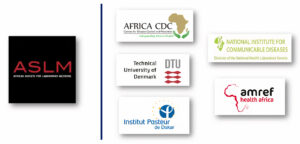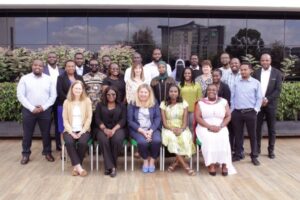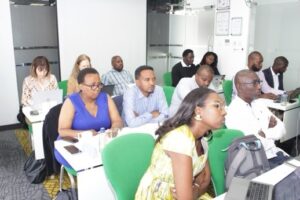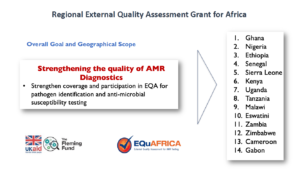EQuAFRICA Phase II Launches with Official Kick-Off in Nairobi, Kenya
 Monday 12th February 2024 marked the initiation of Phase II of the EQuAfrica project, as the team gathered in Nairobi alongside consortium partners Africa CDC, National Institute for Communicable Diseases (NICD), Institute Pasteur Dakar (IPD), Amref Health Africa and other players for a 3-day planning meeting. Mr. Joshua Mwangi, COO at ASLM, expressed gratitude for the success of Phase I, recognizing the support from the Fleming Fund and Mott MacDonald. He underscored the rarity of project renewals and congratulated the EQuAfrica team on their achievements, urging open and honest discussions to enhance the upcoming phase.
Monday 12th February 2024 marked the initiation of Phase II of the EQuAfrica project, as the team gathered in Nairobi alongside consortium partners Africa CDC, National Institute for Communicable Diseases (NICD), Institute Pasteur Dakar (IPD), Amref Health Africa and other players for a 3-day planning meeting. Mr. Joshua Mwangi, COO at ASLM, expressed gratitude for the success of Phase I, recognizing the support from the Fleming Fund and Mott MacDonald. He underscored the rarity of project renewals and congratulated the EQuAfrica team on their achievements, urging open and honest discussions to enhance the upcoming phase.
 The strategic focus of Phase II includes ensuring EQA coverage for Antimicrobial Resistance (AMR) under a unified One health approach, strengthening capacity for a regional AMR EQA program establishment, and enhancing uptake and performance with a major emphasis on sustainability. To offer context specific technical assistance, as part of phase II, participating countries will delineate their priorities and inform the EQA program about their focus areas as outlined in their Country Investment Strategies. Dr. Yewande Alimi, One Health lead and AMR Coordinator Surveillance Division, Africa CDC, stressed the importance of sustainability, domestic funding mobilization, and making a compelling case for funding by showcasing the impact on lives saved and capacities built by the regional AMR EQA program.
The strategic focus of Phase II includes ensuring EQA coverage for Antimicrobial Resistance (AMR) under a unified One health approach, strengthening capacity for a regional AMR EQA program establishment, and enhancing uptake and performance with a major emphasis on sustainability. To offer context specific technical assistance, as part of phase II, participating countries will delineate their priorities and inform the EQA program about their focus areas as outlined in their Country Investment Strategies. Dr. Yewande Alimi, One Health lead and AMR Coordinator Surveillance Division, Africa CDC, stressed the importance of sustainability, domestic funding mobilization, and making a compelling case for funding by showcasing the impact on lives saved and capacities built by the regional AMR EQA program.
Key milestones of phase I include the establishment of regional EQA providers covering all regions of Africa, a regionally owned and operated EQA program for AMR covering 155 national reference laboratories and sentinel sites across 14 countries, and support for 10 laboratories in gaining accreditation to international standards (ISO15189 and ISO17025) across One Health sectors. Additionally, EQuAFRICA developed a national laboratory quality framework, endorsed by Africa CDC, guiding countries in implementing national laboratory quality programs at all levels.
During the opening session, Mr. Anafi Mataka from ASLM emphasized the need for a robust operational plan to ensure a lasting legacy beyond funding. The focus will be on country-to-country collaboration of the EQuAfrica consortium in partnership with ASLM Flemming Fund grantees MAAP, QWaRs, in-country grantees, and other stakeholders to determine common approaches for the implementation of EQA prioritised activities.
Ms. Beatrice Van-Der Puije, the EQuAfrica Portfolio lead, outlined the Phase II objectives, emphasizing the extension of the EQA program’s coverage to additional bacteriology and AMR diagnostic labs in 14 priority countries through the One Health approach. The goals also include ongoing improvements to the informatics system, expanding functionalities such as automated scoring and data analysis. Additionally, there will be a thorough review and enhancement of a business plan for establishing a Regional EQA Program, utilizing existing regional hubs established in Phase 1.
 Phase II will involve a strong knowledge sharing and co-creation, coupled with supporting performance improvement through the management and expansion of the AMR Communities of Practice (COP) platforms, conducting bi-monthly ECHO sessions, and establishing a knowledge hub. Furthermore, efforts will be directed towards training laboratory professionals from AMR NRLs in 14 priority countries to enhance national capacity for establishing EQA programs. The initiative also includes refining and enhancing tools developed in Phase I and providing countries with necessary tools to support the establishment of National EQA programs.
Phase II will involve a strong knowledge sharing and co-creation, coupled with supporting performance improvement through the management and expansion of the AMR Communities of Practice (COP) platforms, conducting bi-monthly ECHO sessions, and establishing a knowledge hub. Furthermore, efforts will be directed towards training laboratory professionals from AMR NRLs in 14 priority countries to enhance national capacity for establishing EQA programs. The initiative also includes refining and enhancing tools developed in Phase I and providing countries with necessary tools to support the establishment of National EQA programs.
The 3-day meeting aims to define work plans, assign responsibilities, and outline outcomes for Phase II. Increased regional collaboration, improved laboratory EQA Performance and strengthened National health systems are the expected outcomes of phase II of the EQuAfrica project.”

